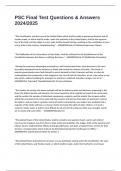PSC Final Test Questions & Answers
2024/2025
"This Constitution, and the Laws of the United States which shall be made in pursuance thereof; and all
treaties made, or which shall be made, under the authority of the United States, shall be the supreme
law of the land; and the judges in every state shall be bound thereby, anything in the constitution or laws
of any state to the contrary notwithstanding." - ANSWERSArticle VI (National Supremacy Clause)
"The Ratification of the Conventions of nine States, shall be sufficient for the Establishment of this
Constitution between the States so ratifying the Same." - ANSWERSArticle VII (Ratification Procedure)
"Among the numerous advantages promised by a well constructed Union, none deserves to be more
accurately developed than its tendency to break and control the violence of faction. The friend of
popular governments never finds himself so much alarmed for their character and fate, as when he
contemplates their propensity to this dangerous vice. He will not fail, therefore, to set a due value on any
plan which, without violating the principles to which he is attached, provides a proper cure for it." -
ANSWERSThe "Extended" RepublicFederalist 10 James Madison
"The smaller the society, the fewer probably will be the distinct parties and interests composing it; the
fewer the distinct parties and interests, the more frequently will a majority be found of the same party;
and the smaller the number of individuals composing a majority, and the smaller the compass within
which they are placed, the more easily will they concert and execute their plans of oppression. Extend
the sphere, and you take in a greater variety of parties and interests; you make it less probable that a
majority of the whole will have a common motive to invade the rights of other citizens; or if such a
common motive exists, it will be more difficult for all who feel it to discover their own strength, and to
act in unison with each other." - ANSWERSFederalist 10
"The judicial Power of the United States, shall be vested in one supreme Court, and in such inferior
Courts as the Congress may from time to time ordain and establish. The Judges, both of the supreme and
inferior Courts, shall hold their Offices during good Behavior, and shall, at stated Times, receive for their
Services a Compensation which shall not be diminished during their Continuance in Office." -
ANSWERSThe Judicial Branch Article III, Section 1
"The judicial Power shall extend to all Cases, in Law and Equity, arising under this Constitution, the Laws
of the United States, and Treaties made, or which shall be made, under their Authority; to all Cases
, affecting Ambassadors, other public Ministers and Consuls; to all Cases of admiralty and maritime
Jurisdiction; to Controversies to which the United States shall be a Party; to Controversies between two
or more States; [between a State and Citizens of another State;] between Citizens of different States;
between Citizens of the same State claiming Lands under Grants of different States, and between a State,
or the Citizens thereof, and foreign States, Citizens or Subjects." - ANSWERSArticle III, Section 2,
Paragraph 1
"In all Cases affecting Ambassadors, other public Ministers and Consuls, and those in which a State shall
be Party, the supreme Court shall have original Jurisdiction. In all the other Cases before mentioned, the
supreme Court shall have appellate Jurisdiction, both as to Law and Fact, with such Exceptions, and
under such Regulations as the Congress shall make." - ANSWERSArticle III, Section 2, Paragraph 2
"[The President]...shall nominate, and by and with the advice and consent of the Senate, shall appoint
ambassadors, other public ministers and consuls, judges of the Supreme Court, and all other officers of
the United States, whose appointments are not herein otherwise provided for, and which shall be
established by law." - ANSWERSAppointment of Article III Judges Article II, Sec. 2:
Article II, Sec. 4:
"The President, Vice President and all civil Officers of the United States, shall be removed from Office on
Impeachment for, and Conviction of, Treason, Bribery, or other high Crimes and Misdemeanors."
Article 1, Sec. 2:
"The House of Representatives shall chuse their Speaker and other Officers; and shall have the sole
Power of Impeachment"
Article 1, Sec. 3:
"The Senate shall have the sole Power to try all Impeachments. When sitting for that Purpose, they shall
be on Oath or Affirmation. When the President of the United States is tried, the Chief Justice shall
preside: And no Person shall be convicted without the Concurrence of two thirds of the Members
present." - ANSWERSRemoval of Article III Judges
The Presidency Organization of Article II - ANSWERSuSec. 1: Vesting of Executive Power and Creation of
Presidential Office
uSec. 2: Presidential Powers/Rights
uSec. 3: Presidential Duties
uSec. 4: Presidential Removal




